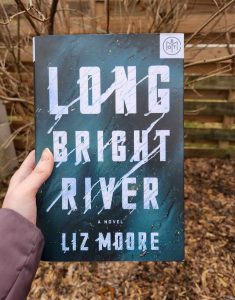 Sisters Mickey and Kacey could not be more different. Mickey is quiet, shy, a single mother, and a police officer. Kacey is bold, outspoken, living on the streets, and addicted to opioids. In Philadelphia, rocked by the opioid crisis, this is not uncommon and Mickey is forced to watch her sister’s struggles from a distance until she is goes missing and a string of murders begin to occur, targeting addicted women living on the streets. Despite orders from her superiors and those who love her, Mickey can’t stop herself from getting involved because she too has an addiction and, as history has shown, that is her sister.
Sisters Mickey and Kacey could not be more different. Mickey is quiet, shy, a single mother, and a police officer. Kacey is bold, outspoken, living on the streets, and addicted to opioids. In Philadelphia, rocked by the opioid crisis, this is not uncommon and Mickey is forced to watch her sister’s struggles from a distance until she is goes missing and a string of murders begin to occur, targeting addicted women living on the streets. Despite orders from her superiors and those who love her, Mickey can’t stop herself from getting involved because she too has an addiction and, as history has shown, that is her sister.
Overall this was a good book. Ms. Moore tackled a very difficult but real topic in this book which is the growing opioid addiction plaguing much of the United States. This is the main focus, to the point where the murder mystery is a second plot point, something I didn’t mind at all. I found Ms. Moore’s portrayal of Mickey and Kacey’s dysfunctional relationship to be very interesting and, from the little bit I know about how addiction affects familial relationships, accurate. The two women have a co-dependent relationship. Kacey needs Mickey for money, emotional support, and for her to pick up the pieces. Mickey needs Kacey because she is the last chance she has at having a real family, something that drives many of Mickey’s actions in the book. Truly, it is their relationship that makes this book stand out amongst the rest.
Though this book is long, it doesn’t feel that way and reads fairly quickly. As I previously mentioned the murder mystery featured is a second story plot but Ms. Moore doesn’t let it fall to the waste side. It repeatedly comes up and is the main driving force as to why Mickey is desperately searching for Kacey when, if these murders weren’t happening, Mickey would shrug it off and assume Kacey would show back up on the streets soon enough.
That being said there is surprisingly a lack of events that occur in the book and at times I felt like I was reading something that had already been covered. I did like the flashbacks Ms. Moore featured but at times it felt like we were rehashing something already addressed. Perhaps that was a creative decision as it reflects the ongoing cycle of addiction. My other criticism of the book and this is more of a grammatical preference, is that Ms. Moore didn’t use quotation marks when characters were speaking. It was either dashes or included in long chunks of paragraphs, which can be a little frustrating as you might be reading a description of something and then suddenly someone is talking and you have to go back and reread. But, this is a personal preference and not something I would say should drive you away from reading the book.
Ultimately, this is a well crafted story centered around an epidemic that is very much present in our society and this book is a strong start to the 2024 reading year.



Add Your Thoughts